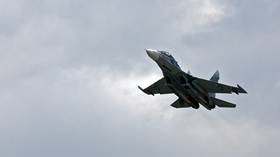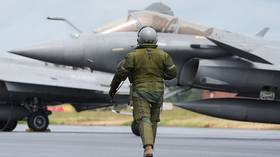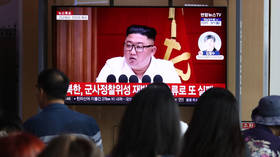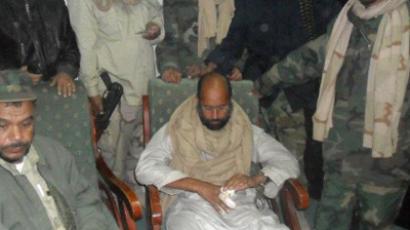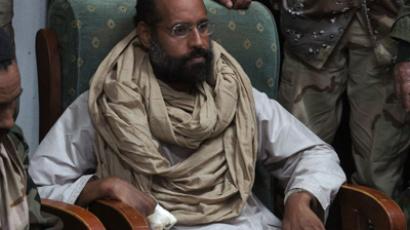‘President Bush should be criminally investigated for torture’
After the Iraq and Afghanistan wars, the US has come under intense scrutiny for its use of ‘enhanced interrogation techniques’ that many experts have called torture. Now there are calls to bring those responsible in the US government to justice.
Philippe Sands is a Professor of Law at University College, London. In his new book “Torture Team”, Sands explores the legality and ramifications of the US program of state-sponsored torture behind closed doors at Guantanamo Bay. In an RT interview, Sands discusses the possibility of one day bringing those responsible to justice.Russia Today: So what torture or interrogation techniques have actually been used at Guantanamo?Phillipe Sands: Well, it’s pretty well established now what emerged. They adopted in the autumn of 2002, in the US Department of Defense a series of 18 techniques of interrogation arranged in three groups. The first group was shouting and screaming. The second group upped the ante, so to speak, and included sleep deprivation and the use of dogs to induce fear. And then category three, the worst of all, included water-boarding and the use of water to induce misperceptions of suffocation. That document emerged after the Abu Ghraib images emerged, and I was interested to find out how a country which has turned its back against torture could have moved to adopt these techniques of interrogation. So I began, really sort of in 2005, to begin to look more closely through a series of interviews across the United States on what had happened. And what had been done by the administration was to spin a story which effectively said it started down at Guantanamo – there were a group of individuals down at Guantanamo – and that it had then worked its way up the system. What I established was that story was not accurate. What had happened was that it had started at the top and then worked its way down with significant pressure from the Pentagon in particular, and people around the White House. So the tone was very different from the one which the administration has spun.RT: How easy was it to uncover that truth?PS: I began by knowing that I had to speak to people who had not previously spoken down at Guantanamo, and I focused on the lawyers. And I began to approach a number of lawyers. And once I had found one lawyer who was willing to speak with me, who was a staff judge advocate down at Guantanamo who was involved at the time back in 2002, once she had given me an account of what had happened, I could then go to the next person and say, ‘well, publicly it says this, but I’ve now been told by this person who worked underneath you, that this is in fact what happened, would you care to comment on it?’ And the door would then begin to open.RT: What are the implications of your findings? I mean, you argue in your book that some of these techniques equate to war crimes, is that right?PS: Well, I focused on the interrogation of one individual, detainee number 63, alleged to be the 20th September the 11th highjacker, a man called Mohammed al-Qahtani, a Saudi national, and I focused in particular on what had happened to him in the period of November of 2002 to January of 2003. I reached the conclusion without any real difficulty that he had been subject to techniques that amount to torture. Torture is an international crime, whether you call it a crime against humanity or a war crime, it’s prohibited under international law. The United States is a party to an international convention that outlaws it, and the bottom line of it is that if you engage in torture as a state, you are responsible, and you are responsible to do a number of things, and one of the things you have to do is you have to investigate. You have to investigate what happened, and that has never fully occurred. Even the administration of President Obama has, if you like, turned its back on the possibility of a proper investigation to ascertain who authorized what, when, precisely. It wasn’t a few bad eggs. It was people right up at the top.RT: Namely?PS: Well, President Bush ultimately said he signed off on water-boarding, and that happened in the summer of 2002 with a group of individuals present at the top – Donald Rumsfeld, Condoleezza Rice was involved in the process – and various lawyers in the National Security Council and in the Department of Justice who signed off on water-boarding. They approved water-boarding, they gave their support to water-boarding, and that to me was shocking. So what I wanted to know was how could, in particular, lawyers that have been to the finest law schools in the world – to Harvard, to Duke, Georgetown, I mean, terrific law schools – how had they got themselves into a state where they were willing to sign off on techniques that amounted to torture? RT: And what was their answer?PS: Well, I think there was a sense of intense pressure that the United States was under and unparalleled threat, and I don’t think that’s a justification or an excuse, or a reason, but there was a tremendous sense of pressure coupled with the fact that a number of the lawyers involved at very senior levels had no real background in the subject of international law – the protection of the rights of the individual – and were very ideological in their approach. Basically, they saw their function as lawyers; not as being there to give independent legal advice, but to give the president the tools to do what he wanted to do. That’s not the function of a lawyer in any society, in any democratic society. RT: But surely water boarding rings alarm bells with any lawyer?PS: It should have rung alarm bells, and it did ring alarm bells in many parts. What I established was that two of the major organs of government in the United States were cut out of the process. The military, the upper echelons of the military, were cut out of the process by Donald Rumsfeld and General Counsel Jim Haynes. And the State Department was cut out of the process, and the lawyers at the State Department and the lawyers at the Department of Defense; the career military lawyers know better than anyone that it’s in the United States best interests not to engage in this kind of activity. So they were cut out of the process, and instead you’ve got a group of ideologues brought in to give the president the tools to do what he wanted to do, irrespective of whether there was a reasonable argument that it was lawful or not. RT: Which individual moment that you investigated would you say shocked you most? PS: When I was speaking with the folks who were down at Guantanamo, I discovered, and my book actually broke the story, that one of the influences in the autumn of 2002 was a television program called “24”, which was a TV program about the use of torture which promotes the idea really that torture works; it produces results, is a sensible way to proceed. And one of the people that I interviewed confirmed to me, actually unexpectedly because I really hadn’t asked the question, that “24” was a big influence and it created an environment, and you began to see the connection between popular cultural TV programs and what people do. That was shocking. RT: So is there any chance those responsible for what went on at Guantanamo Bay will actually be held to account? PS: There’s already some degree of accountability, I mean, there’s a group who are known as ‘The Bush Six’, the six main lawyers at the top of the Bush administration: the former attorney general Alberto Gonzales, the former Department of Defense lawyer Jim Haynes, some of the Department of Justice lawyers, John Yoo, Jay Bybee. It’s very difficult for them to set foot outside the United States now; there’s every possibility that they could be subject to questioning if they were to set foot outside the United States. So there’s some degree of accountability, but my position is that this is a breach of law, this is potentially a crime, and you need a criminal investigation. And that has not happened. And there’s no indication that it will happen. RT: What about former President Bush? Is there a chance he could actually be charged with war crimes? PS: I mean, President Bush has rather brazenly given a series of interviews in which he says water boarding is right, ‘if I had to do it, I’d do it again’. Dick Cheney said the same thing, and has taken responsibility for it, and that’s had certain consequences in the sense that some of his international travel has been limited. He was due last year to go to Switzerland; that didn’t happen it is said, because there were questions. There have been protests when he’s gone to Canada, and who knows what will happen over time? One of the things that I was involved with many years ago was the case of Pinochet. That was of course a different time, a different scale, but it took 25 years for the wheels of justice to sort of creak into motion, and one day visiting London he was arrested. So these things take time. You don’t know when these things are going to produce results, or what’s going to happen, and the question of responsibility hangs in the ether. RT: Moving us onto to other matters now, Saif Gaddafi’s trial. Libya’s announced that the trial will go ahead in Libya under their laws, but given what happened to his father, surely there are concerns over Libya’s ability to actually hold a fair trial?PS: Yes, I think there are concerns about a fair trial; Libya’s not a country which over the past four decades has come to be associated with the highest standards of criminal justice. I think it’s reasonable to conclude that there are problems. Saif Gaddafi has been indicted internationally. I think there are good arguments on trying him in Libya or trying him in the international criminal court. But if he’s tried in Libya, the proceedings have to meet minimum international standards, and that can be done in a variety of ways, but you can’t have summary justice. RT: But since the arrest warrant was actually issued by the International Criminal Court, then surely there isn’t any actual legal framework for Libya to hold the trial?PS: The International Criminal Court works on the basis of a principle called “complimentarily.” The ICC, the international court in The Hague, steps in if justice is not done locally. So if justice is not done locally, there has to be an international trial. If the Libyans can demonstrate to the international criminal court that they can meet minimum international standards, then they’re free to try him domestically. But I think they’re going to have to show to the international criminal court judges that they meet those international standards, and I suspect Saif Gaddafi himself would be rather happy at being tried in the Hague, where he knows he’s going to get minimal rights, and of course he’s not going to get the death penalty. RT: You’ve also written extensively about the Iraq war and the legal issues surrounding that. Do you see any similarities between the run up to what happened then and what’s happening now in the standoff between Iran and the west? PS: Iraq went very wrong. I think we know it went very wrong. And there are very few people in this country, in the United Kingdom, who now really want to stand up for Iraq on policy grounds, and even fewer on legal grounds. I focused on it as a legal matter; it was not, in my view, authorized by the Security Council, it did not meet international legal requirements, and it was therefore an illegal war. But I think lessons have been learned from that experience. We saw some of that in relation to Libya. We saw that the Security Council did adopt a resolution, Russia and China did not veto a resolution permitting some use of force. The question as to whether they exceeded the mandate, there’s a debate about that. But there was a Security Council resolution. Iran is working its way through the Security Council, who knows which way it will go, but I suspect the lesson of Iraq is such that it will be very difficult to imagine the kind of coordinated military response with a large number of countries involved, a la Iraq, in the case of Iran in the absence of proper Security Council authorization.


